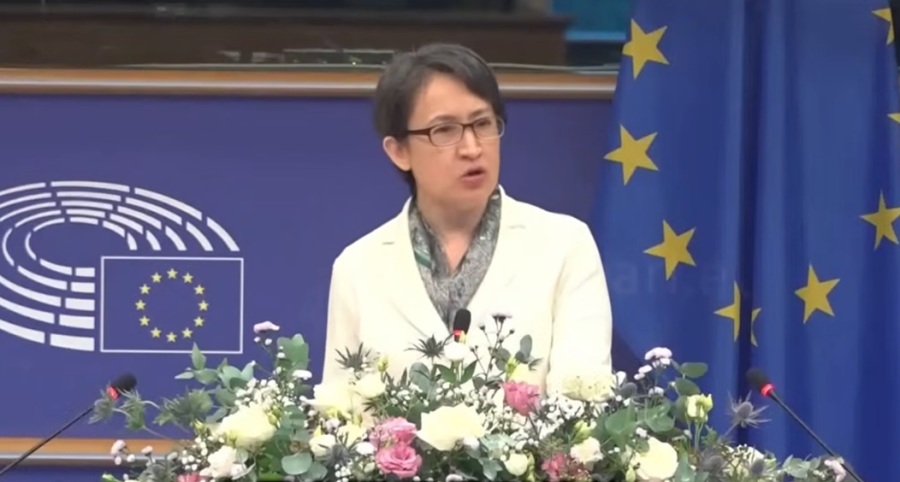On November 7, 2025, Taiwan&9;s Vice President Hsiao Mei-chin delivered a speech at the European Parliament, which was met with thunderous applause, as European Parliament members eagerly sought to take photos with her. (Video screenshot)
[People News] Japan–China relations have sharply deteriorated over the past week. The trigger was that when Sanae Takao was questioned in the Japanese Diet, she mentioned that Taiwan is under threat of military force, which “may constitute an ‘existential crisis situation’ under Japan’s national security law,” implying that Japan might send troops to aid Taiwan. This provoked the CCP’s Consul General in Osaka, Qin Jian, who spewed vicious words, saying “that kind of filthy head should just be cut off.” Takao then once again stressed that she would not retract her statement. The CCP then mobilized its full range of official media, unleashing a massive barrage to condemn Japan, posturing as though ready for war at any time.
That was not enough. The Japanese government even brought out the “heavenly king,” specially issuing an award to former Taiwan Representative to Japan Frank Hsieh. This action was clearly a deliberate “slap in the CCP’s face,” necessary to demonstrate a tough position toward China.
The deterioration of Japan–China relations is not an isolated phenomenon. Ever since Trump’s tariff war cooled down, the Western democratic camp has almost simultaneously launched a wave of diplomatic offensives targeting the CCP. In Japan there is Sanae Takao; in Europe, Taiwan Vice President Hsiao Bi-khim appeared at the European Parliament, and President Tsai Ing-wen publicly delivered a speech at the Berlin Freedom Parliament, receiving unprecedented courtesy. Later, Taiwanese legislator Shen Boyang — who is wanted by the CCP — was invited to speak at the German Bundestag. Recently, Taiwanese DPP legislator Huang Chieh attended the World Young Leaders Summit in Germany, receiving the “Politician of the Year Award.”
So many Taiwanese political figures suddenly appearing in Europe’s diplomatic circles is an extremely rare phenomenon. It proves that the political and diplomatic spheres in Europe no longer care about the CCP’s political taboos — whatever the CCP dislikes, European politicians will do. Take Shen Boyang for example: he is wanted globally by the CCP, yet the German Bundestag invited him to deliver a public speech. This clearly treats the CCP’s “wanted order” as a joke, intentionally provoking the CCP, knowing full well that the CCP can do nothing about it.
Compared with Japan, the CCP’s response to Europe’s anti-CCP sentiment has been much less intense, limited to routine protests that Europeans treat like background noise. The reason, of course, is that the EU contains many major Western powers, and diplomatic damage would be significant; additionally, due to unfavorable conditions in the U.S.–China trade war, the CCP still hopes to maintain access to European markets.
When Sanae Takao made her remarks, the CCP initially responded with a low-level diplomat. Unexpectedly, that person acted recklessly and made inflammatory comments, angering the Japanese government and public. The CCP then found itself riding a tiger — it couldn’t recall Qin Jian, nor could it expel Japanese diplomats in retaliation. With no good options, it could only launch a loud, full-scale war of words against Japan.
The CCP had no choice but to respond to Japan’s move because years of wolf-warrior diplomacy have created a rigid and vicious image — displaying brute force abroad and buying nationalist sentiment at home. If it swallowed Europe’s humiliation and also swallowed Japan’s provocation, its embarrassment would be unbearable even internally. Therefore, verbally attacking Japan became a necessary step.
Although Japan–China relations have rapidly worsened, both sides are only engaging in a war of words; actual war is still far away. For the two countries to go to war, there would have to be irreconcilable national interests. Japan and the U.S. have a security treaty, and tens of thousands of U.S. troops are stationed in Japan. The cost of war would be enormous; although starting a war is easy, knowing who would win is uncertain, and cleaning up afterward would be extremely difficult. Unless absolutely necessary, why create trouble for themselves?
What is disadvantageous for the CCP today is not whether war will break out, but that a global anti-communist wave is rising, one wave after another, and the CCP is completely unable to cope. When the CCP practiced wolf-warrior diplomacy years ago, China’s economy was rising, the country was strong, and the U.S. and the West followed appeasement policies, reluctant to openly confront the CCP. Thus, wolf-warrior diplomacy seemed intimidating for a time.
Times have changed. The CCP’s domestic economy and society are now facing the worst crisis in forty years, and U.S.–China relations are deteriorating further. Under such circumstances, the backlash from wolf-warrior diplomacy has rapidly surfaced. Countries that endured resentment for years are now taking the chance to retaliate while the CCP is weakened. Nations are simultaneously taking action against the CCP, leaving it besieged on all sides.
Of course, the fact that nearly all Western countries are willing to openly break with the CCP at the same time must be due to the United States “stirring the pot” behind the scenes; otherwise it would be hard to coordinate such synchronized actions. Leaders of the UK, France, and Germany have visited the White House multiple times this year. On the surface, they came to seek aid for Ukraine, but behind closed doors they surely discussed global strategy. The CCP has become the common enemy of Western countries. After stepping back from the tariff war, the U.S. continues to focus its diplomatic and military priorities on Asia to counter the CCP — a goal that is obvious to all. European countries understand this well and have begun showing a tough stance toward the CCP.
As for Japan, during Trump’s earlier trip to Asia, he and Sanae Takao had already developed considerable mutual understanding. The U.S. recently agreed to assist South Korea in building nuclear submarines, and the U.S. Secretary of War has visited Japan, South Korea, and Vietnam in succession to plan long-term military strategy. All of this is part of the groundwork for a global anti-communist wave.
In the past, the CCP believed that wolf-warrior diplomacy could pave the way everywhere. But in reality, wolf-warrior diplomacy has made the CCP like a street rat that everyone shouts at. And this time, it is no longer something the CCP can fix by simply adjusting its diplomatic posture. Now, when the CCP acts aggressively, it is ineffective; when it pretends to behave, that also fails. In short, whatever the CCP likes, the world will sabotage; whatever the CCP hates, the world will strive to embrace.
Sanae Takao once said: “Taiwan and Japan are similar in many ways. Both must strengthen their self-defense capabilities in the international arena. Countries that share the ideals of democracy and freedom should form quasi-military alliances and defend each other in order to secure their own safety.” — The term “quasi-military alliance” is particularly noteworthy. These remarks can be summarized as a new grand international strategy of the Western democratic camp. From this perspective, the global anti-communist wave is historically inevitable.
This global anti-communist wave has created an unprecedentedly favorable international environment for Taiwan. When the CCP prospers, Taiwan suffers; when the CCP suffers, Taiwan prospers. Taiwan is steadily stepping onto the world stage — this is the moment. As Xi Jinping sits trapped in Zhongnanhai, how can he “pass his days”?
(The author’s Facebook) △
-
a summary.











News magazine bootstrap themes!
I like this themes, fast loading and look profesional
Thank you Carlos!
You're welcome!
Please support me with give positive rating!
Yes Sure!